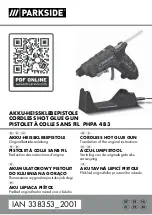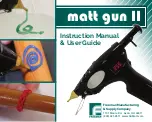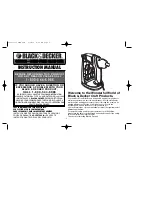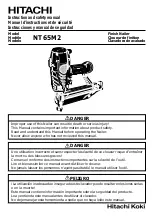
10
Keep fingers AWAY from trigger when not driving
fasteners to avoid accidental firing. Never carry tool with finger on
trigger. In “Contact Actuation Mode” tool will fire a fastener if safety
is bumped while trigger is depressed.
Never point tool at yourself or others.
Never attempt to drive a fastener into material that is too hard, or at
too steep an angle, or near the edge of the workpiece. The
fastener can ricochet causing personal injury.
Disconnect tool from air supply before performing
maintenance, clearing a jammed fastener, leaving work
area, moving tool to another location, or handing the tool
to another person.
Clean and inspect tool daily. Carefully check for proper
operation of trigger and safety mechanism. Do Not use the tool unless
both the trigger and the safety mechanism are functional, or if the tool is
leaking air or needs any other repair.
The depth to which a fastener is driven is controlled by the depth adjustment
(A) Fig.
26.
The depth of drive is factory adjusted to a maximum setting. Test
fire a fastener and check depth. If a change is desired: loosen locking screw
(B) Fig.
26
,
with hex wrench (D) Fig. 27 provided,
slide adjustment to desired
position and retighten locking screw (sliding the two members closer
together increases the depth of drive, sliding the two members farther apart
decreases the depth of drive). Test fire another fastener and check depth.
Repeat as necessary to achieve
desired results. The amount of air
pressure required will vary depending
on the size of the fastener and the
material being fastened. Experiment
with the air pressure setting to
determine the lowest setting that will
consistently perform the job at hand.
Air pressure in excess of that
required can cause premature wear
and/or damage to the tool.
Fig. 26
S
Fig. 24
A
B
C
D
A
B
C
Fig. 25
908987 - 12-20-02.qxd 12/17/02 10:08 AM Page 10

































